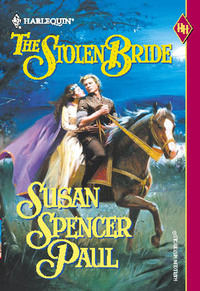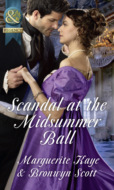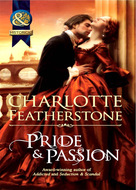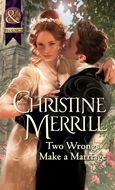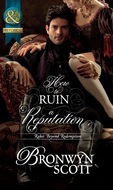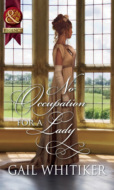Kitap dosya olarak indirilemez ancak uygulamamız üzerinden veya online olarak web sitemizden okunabilir.
Kitabı oku: «The Stolen Bride»
“You are all unclothed, Kayne…you have not been out in this weather?”
“Aye,” he murmured.
“But why?”
“To find a measure of peace.”
Sorrow knifed through her, far more painful than what her body had just experienced. “Oh, Kayne,” she murmured sadly, stroking strands of wet hair from his face. “’Tis all my fault. I am so deeply ashamed and sorry.”
He shook his head. “You are not the one to blame, Sofia. It is my own sickness that makes me ill within. You are my only refuge from the misery of it. I need you, Sofia.” Whispering the words this time, he said again, “I need you. But if you tell me to leave, I will go at once. Indeed, I should go. I have no right to ask anything of you.”
Sofia swallowed heavily. “I want you to stay, Kayne. But I am afraid…!”
The Stolen Bride
Harlequin Historical #535
#536 SILK AND STEEL
Theresa Michaels
#537 THE LAW AND MISS HARDISSON
Lynna Banning
#538 MONTANA MAN
Jillian Hart
The Stolen Bride
Susan Spencer Paul

MILLS & BOON
Before you start reading, why not sign up?
Thank you for downloading this Mills & Boon book. If you want to hear about exclusive discounts, special offers and competitions, sign up to our email newsletter today!
Or simply visit
Mills & Boon emails are completely free to receive and you can unsubscribe at any time via the link in any email we send you.
Available from Harlequin Historicals and SUSAN SPENCER PAUL
*The Bride’s Portion (as Susan Paul) #266
*The Heiress Bride (as Susan Paul) #301
*The Bride Thief #373
Beguiled #408
*The Captive Bride #471
*The Stolen Bride #535
To my beautiful daughter, Carolyn,
who came up with the title for this book,
and who fills each day of my life with joy.
Contents
Chapter One
Chapter Two
Chapter Three
Chapter Four
Chapter Five
Chapter Six
Chapter Seven
Chapter Eight
Chapter Nine
Chapter Ten
Chapter Eleven
Chapter Twelve
Chapter Thirteen
Chapter Fourteen
Chapter Fifteen
Chapter Sixteen
Chapter Seventeen
Chapter Eighteen
Chapter Nineteen
Chapter Twenty
Chapter Twenty-One
Chapter Twenty-Two
Chapter One
“Nay, Father, I tell you I will have none of him. And I’ll not see him. Sir Griel must suffer the disappointment, I fear.”
With this, Sofia returned her attention to the needlework in her lap. She was perfectly calm.
Her father, however, stood in his place near the door, sweating profusely and wringing his hands.
“Sofia, you must come and speak with him,” Sir Malcolm pleaded. “You know what it means to overset Sir Griel. I beg you, daughter, only speak to him, show him a measure of sweetness, such as you alone can do. That will be enough to sate him for a time.”
Sofia was unmoved by this.
“Sir Griel is a violent, evil, untoward man, Father, and I’ve no wish to sate him in any way. What I desire is that he leave us in peace, for I vow I shall never wed him.” The thought made her visibly shudder. “Nothing could induce me to it.”
“God’s mercy,” her father said, shaking his head. “He’s brought twelve men. Twelve, Sofia, and all fully armed. They’re standing with him now in the great room below, awaiting your arrival. If you don’t go to him, he’ll wreak havoc. I know he will.”
“He only means to intimidate you, Father,” she said soothingly. “If you refuse to be thus cowed, he’ll leave you be, in time.”
“Nay, he’ll not leave at all, until you’ve come to speak to him,” her father insisted. “He has said so, and I’ve no desire to put such a challenge to the test.”
Sofia sighed loudly.
“Sofia, please,” Sir Malcolm begged.
She set her needlework aside and stood.
“Very well.”
“There,” he said with relief. “That’s a good daughter you are, Sofia. A very good daughter. Make certain to tell Sir Griel that—”
“I shall bid him to the devil, my lord,” she stated, striding out of the room, “as I do every time I see him.”
Sir Griel Wallace was a dark, ominous man, short but muscular, with hair, beard and eyes as black as coal. He was standing near the large hearth in the great room as Sofia descended the stairs, and turned to watch with open appreciation as she approached. Just as her father had said, a dozen of Sir Griel’s fighting men were with him, standing on either side of the room, looking very much as if they had prepared for a battle.
Sofia could scarce blame her father for being so distressed at the sight of them. Sir Griel had clearly brought them with the intent of intimidating the entire household—herself included. The last time he’d come to visit her, she’d treated him to a rigidly polite manner of behavior which forced a certain formality from him in turn, but she’d found it impossible not to scoff at his few crude attempts at love-making. His pride had not withstood such a rebuff, no matter how intelligently or elegantly given, and he’d left Ahlgren Manor red with anger.
With this visit, he clearly meant to make himself better understood, if not through sweet speeches, then through a show of force.
As Sofia moved across the room, Sir Griel gave a signal, causing all his men to straighten to attention. Sofia lifted her chin and ignored them.
“Mistress Sofia,” Sir Griel said. “Your beauty, as always, is a welcome sight. I pray I have not come at an unseasonable time?”
He held a hairy, burly hand out, palm open, in what was obviously meant to be a grand gesture. Sofia set her teeth and strove to appear gracious as she laid her own in it. He was abnormally hairy, and was covered down to his fingertips with thick black hair which made him look far more like a heavily furred animal than a man. The idea of having to receive such a man’s intimate caresses made Sofia feel exceedingly ill. Just touching him now caused her stomach to churn nauseatingly.
“My lord, Sir Griel,” she said in proper reply, making a curtsey and deftly sliding her hand free all in one smooth movement, “I am sorry to say that you have. I am used to making my visit to the village at this time of day, and was nearly ready to depart.”
He made a bow. “Forgive me, mistress. I was not aware that you kept such steady habits. I would be greatly honored if you would allow me to accompany you throughout the village as you pursue your duties.”
“You are kind,” Sofia said with a thin smile, “but I require no such escort. I am very happy to go with but my maid and a few menservants to fetch and carry, and you are far too busy a lord to waste such time upon anything so foolish. And this could not be your purpose in honoring us with your presence, I think.”
“Nay, ’twas not,” he admitted, frowning. “I had thought to spend some time in your company, however, and so I told your father. I believe you realize my purpose.”
Sofia gazed at him, all innocence. “Do I, my lord?”
His already dark face darkened even more, and his brow furrowed. “If not, I shall tell you plainly. I mean to court you, Mistress Sofia, and to that purpose I have come and will continue to do so until you agree to be my wife.”
Sofia regarded him steadily, taking in his fine, rich manner of dress, his strong and muscular body, his intensity of expression and temper. She supposed that there were many women who would be grateful to become the wife of Sir Griel Wallace. He was titled and well favored by the king’s regents. His estate, Maltane, was among the finest in Sussex, and he was powerful both in the strength of the small army of knights and soldiers he kept at his castle and the enormity of his wealth.
But she could not rejoice at the idea of such a match. Sir Griel was a cruel man. There was not the least bit of sway or softness in him, and he must ever have his way or no way at all. She’d witnessed his implacable nature firsthand in his dealings with the merchants and craftsmen in the village, all of whom lived in dread of Sir Griel’s random visits. Once he’d whipped a villager simply because the man had walked in front of his horse, and Sofia had heard rumors of far worse beatings that were regularly dealt out to any of his castle servants who happened to displease him.
Standing firm against such a man was not so easy a matter as Sofia wished it might be. Everyone in and around the village of Wirth was afraid of Sir Griel, most especially her father. And she knew very well that if he’d determined to have her for his wife, he wouldn’t take her refusal easily. But Sofia would not be cowed by the man, though she found him both fearsome and physically repulsive.
“I believe I understand your meaning, my lord,” she said calmly. “You do me great honor. I am perfectly aware of how much so, and thank you for such kind consideration. However, I fear that you would do better to look elsewhere for a bride. I do not intend to marry.”
Sir Griel’s eyes widened. “Not marry?” he repeated. “Mistress Sofia Ahlgren not marry? ’Tis an impossibility, I vow. ’Twould be a grave sin to let such beauty as you possess go without its proper tribute, my lady. But, nay,” he said, laughing now, “you mean to tease me. I nearly took your word for truth. What a clever female you are, mistress. And how very much,” he added with a more meaningful look, “I shall enjoy taming you.”
Sofia drew herself up full height—almost as tall as he was—and looked at him directly.
“My lord,” she said clearly and distinctly, “pray let us have an understanding. I will not be your wife, and you would do well to look elsewhere. This is my final word on the matter, and now, I beg that you will take your men and leave. Good day to you.”
She turned to walk away from him, but felt his steely hand close over her shoulder, daring to fall where her skin was bare above the neckline of her surcoat, roughly pulling her back. His face, she saw as he jerked her about, was taut with anger.
“We will indeed have an understanding, Mistress Sofia, and one that you will accept. I will have you for my wife. You, and no other woman.”
Sofia was trembling horribly, and knew he could feel it, but with every bit of strength she possessed she held his deadly gaze. “You cannot force me to it, my lord, and you will not. My father will not accept your suit, and even if you should manage to terrify him to such cowardice, I would petition the crown to grant me the freedom of my own authority. In but four months I will attain the age of twenty, and inherit all that comes to me through my mother’s will.”
“Before that day comes,” he vowed, “you will be Lady Wallace, and all that you inherit dowered to whatever children you give me.”
Sofia struggled to be free, but Sir Griel cruelly dug his nails into her bare flesh to keep her captive, drawing long, deep gashes of blood along her skin as Sofia panicked and wrenched away.
Gasping, she reached up a hand to touch the raw, stinging wounds, and gaped at him in shock. Sir Griel looked at the blood he’d drawn with a satisfied smile, and nodded.
“My first mark upon you, Sofia. The first of many, if you continue to displease me.”
Blood seeped through Sofia’s fingers, trickling across the back of her hand and downward in streams to seep into the cloth of her surcoat. She was nearly too shocked to speak, but uttered, “Nay.”
He reached out again, this time to grasp her chin with tight, punishing fingers.
“Aye, mistress.” His voice was low and as dark as he was. “But you’ve time to learn. Four months’ time. Before the day that your twentieth year arrives, you’ll beg me to take you as wife. On your knees, yet. Aye, I shall have the satisfaction of seeing you there, to repay the insult you’ve given me not only on this day, but so many others.”
“No,” she murmured, shutting her eyes, striving to turn out of his grasp. “No.”
“And once you’re my wife,” he went on, “you will learn to please me very, very well. ’Tis a promise I give you, Sofia. A promise—and I do not make such as those lightly, as you will discover. Heed me well, mistress,” he warned, leaning very close. His strong finger squeezed the fine bones of her chin, bringing tears to Sofia’s eyes. “Heed me well,” he repeated more softly, then released her at last.
Sofia reeled back with relief.
Sir Griel held his hand out, his black eyes snapping with command.
“Give me your hand, Sofia.”
She was too frightened now to refuse, and instinctively held out the one that did not yet clutch at her bleeding wounds.
He shook his head once. “Nay, the other. Give it.”
She did as he said, and placed her bloodied hand in his own. He smiled down at it and then lifted it to his lips, seeming to relish kissing her trembling fingers through the blood that covered them. Afterward, he licked his lips of the droplets that remained. Sofia’s stomach lurched at the sight. Free of his touch, she backed away and stared at him with horror. She had thought him merely violent and cruel, but now she knew him for a madman.
Sir Griel made a slight bow.
“I will bid you good day, Mistress Sofia, and pray to visit with you again soon, with a far happier greeting.”
Sofia was painfully aware of the dozen men who had stood silently throughout their lord’s brutal attack. They must all of them be knights, and yet not a one of them had stepped forward to keep a lady from injury. Such was the measure of power that Sir Griel held over them.
Her shoulder burned as with fire, and her surcoat was bloodied. Sofia was ashamed to stand before such an assembly of strangers—with none of her own people, not even a servant to give her company—so completely vanquished. She strove to regain as much dignity as she could by drawing herself up, lifting her hand to cover her wounds once more, and saying, coldly, “Good day, my lord.”
He walked out of Ahlgren Manor with his men at his heels, and Sofia sank into a chair near the fire, yet holding her hand against her shoulder. Slowly, after the sound of Sir Griel’s many horses faded away, the servants began to come into the room. They showed an immediate concern for their lady’s bloody wounds, but she turned them away, and accepted no aid, not even from her father, who entered the great room last of all.
“You must accept him, Sofia,” he said, desperation in his tone. “He’ll kill us all—aye, even you—if he does not get his way. Here, daughter, let me send for the leech to bind your wounds. You cannot go about untended.”
Sofia shook her head and rose from her chair.
“Nay, Father. I’ll tend it myself, as I have tended many such small hurts before. Have no fear. None of the villagers will know what has happened here, if all remain loyal in their silence.” She cast her gaze over the servants, who nodded their agreement.
“But, Sofia,” Sir Malcolm protested, “you cannot go into the village today. You must rest and recover, and think of what you will say when Sir Griel visits us next, for you know it will be soon.”
“There is too much to tend,” Sofia told him stonily, weary and stunned by all that had occurred. “None of it can be put off. I will change my clothes and go, and rest after. As to Sir Griel,” she said as she moved slowly toward the stairs, “I believe he means to give me a measure of time to think upon the folly and danger of refusing him yet again—and you may be assured, Father, that I will use that time wisely, in finding the way to avoid him forevermore.”
Chapter Two
“There,” said Anne the baker’s wife to the women who were gathered near the warmth of her husband’s great ovens. “He’s coming, just as I said he would. Every day, he comes. At noon, and never later.”
The women, as one, leaned to peer out of the baker’s windows at the tall figure walking through the village, drawing ever nearer. Kayne the Unknown was indeed a man worth looking at, and so they all agreed, young and old alike. He was surely the handsomest man ever to set foot in the village of Wirth, as well as the strangest and quietest.
He’d arrived one afternoon a year ago, a stunning figure riding atop a large, black destrier such as only a knight of the realm might possess, tall and powerfully built with hair so blond it was almost white. All the people had come out of their doors to stare at him, wondering how such a man had come to visit their small village. He had gone straight to the abode of their only blacksmith and, upon learning that Old Reed wished to quit his work, bought his home and smithy for so great an amount of money that all who’d heard of it had been amazed. On such a fortune, Old Reed would be well able to spend the remainder of his days in the finest luxury.
But then Kayne the Unknown had done something even more surprising. He had given Old Reed his home and smithy back, freely, in exchange for the promise that the older man would remain in Wirth and help the newcomer set up his own shop, and on those occasions where his skill might prove lacking, impart whatever knowledge might be required.
He’d left Wirth for some few days following that, and those who had applied to Old Reed for every detail had been gravely disappointed. The old man smiled and nodded, but said nothing, save to say that the stranger’s name was Kayne, and that he’d refused to give any other. Shortly after he’d gone, rumors began to fly that the stranger had bought the finest piece of land to be had in Wirth, three full acres that Sir Malcolm Ahlgren had always refused to part with—until now, when enough money had been offered. But where would a mere blacksmith find such money? And why, having it, would he continue to labor at such a trade?
Long before his return the villagers had begun to call him Kayne the Unknown, and to whisper that he wasn’t quite right and therefore not to be trusted. Only a madman—or worse—would labor when he had no cause to, or spend his money in a village so poor and lacking as Wirth. Nay, something was far wrong with Kayne the Unknown. He’d assuredly bring evil and ill-doing to Wirth with his strange ways, and it was decided among the villagers that those of them who were true and Godly folk would stay far clear of such a man.
Kayne the Unknown had returned with several men—carpenters and masons—and built the finest dwelling that anyone in the village had ever seen, apart from Sir Ahlgren’s manor home. It had wooden floors instead of plain earth, and real glass windows like those to be had in the richest castles in England, and a stairway leading to the upper floor, rather than a ladder. Next to the dwelling a large barn had been built, part of it to stable horses, and part to hold a new, and very fine, smithy.
He lived with Old Reed while all was being built, but he made no attempt to introduce himself to the village, or anyone in it. When he went to buy his bread and eggs and other goods, he spoke quietly and briefly, giving but the least return to any greeting or question, and was on his way again before one could do more than attempt the simplest exchange of courtesies.
Two months after he’d first ridden into Wirth, Kayne the Unknown had opened his gate for custom, and on the very same day Old Reed shut his. But no one in the village took their smithing needs to the newcomer, not for many weeks, preferring instead to make the journey to nearby Wellsby to make use of the blacksmith there.
But one night, five months and more after Kayne the Unknown’s arrival, a fire had started in Harold Avendale’s dwelling, and become so quickly fierce that no one dared rush in to save the family—no one, save Kayne the Unknown. He’d burst the door wide with a mighty thrust of his powerful body and gone charging in past the smoke and heat to bring out not only Harold and his wife and children, but even a table and three chairs that had not yet caught fire. And he’d remained, after all this, his blond hair singed nearly black and his face and hands angrily red with many burns, and helped to douse the cottage with water from the village well.
When it had all been over, the damage great but enough left to rebuild, Harold had sought to give Kayne the Unknown his thanks—though it would be impossible to impart enough gratitude for such gifts as the lives of his family. But Kayne the Unknown had disappeared, and could not be found.
For many days afterward, the gate to his smithy had remained shut, and he’d made no visits to the village. Harold and his wife had taken him two loaves of bread and a pail of fresh milk one morn, not daring to enter his dwelling, but leaving the offerings of gratitude at his door. Otherwise, the only person who’d had the courage to visit Kayne the Unknown had been their own good lady, Sir Malcolm’s daughter, Mistress Sofia, who had been seen entering his dwelling each morning and evening following the fire, always with her maid and always with a basket of her medicinal treatments. She had looked very grave the first two days, both coming and going, but by the third day had regained her usual calm manner. By the fourth day, she had declared herself—when asked about Kayne the Unknown’s progress—well pleased.
One month later, Kayne the Unknown had opened his gate again, and the villagers had come, one by one, to seek his services. Before the noon hour there had been a line ten deep until Kayne the Unknown, his burnt hair cut short by Mistress Sofia and one of his hands yet bandaged, had at last asked those remaining to return the following week, for he had more than enough to keep him busy until then.
His bravery in the fire had not been enough to make Kayne the Unknown completely acceptable to the village, but it had been sufficient to make him acceptable as their blacksmith. And a grand blacksmith he was, at that, as able as Old Reed had been, if not moreso. If Kayne the Unknown was yet content to keep his own company and remain quiet and apart, no one complained of it so much anymore.
But they did continue to whisper. And with good reason, for he was a man possessed of strange habits, who went out riding late at night on his great destrier, its hooves making a loud, eerie sound as he rode through the village in the dark chill of both night and early morning.
No one in Wirth, save Mistress Sofia and her maid, had been allowed into Kayne the Unknown’s dwelling, but there were rumors that he had many rare and extraordinary possessions. A locked chest filled with a treasure of precious jewels, and books—which surely he must be able to read, if he had them—and many strange weapons which no mortal man had ever before seen or been known to use.
And some of the villagers vowed that they had seen Kayne the Unknown meeting with frightening strangers during his nighttime wanderings. Men dressed in armor, on horseback, like ghostly warriors come out of battle.
Aye, there was much that was odd and fearsome about Kayne the Unknown, and the villagers of Wirth spent a great deal of time trying to discover all there was to know of him. Especially the women, who could scarce understand why a man so handsome and moneyed should not also have a wife. There was many a pleasing maiden in the village, and the mother of each would have happily seen her daughter wed to Kayne the Unknown—aye, despite his strange and quiet ways.
“Now, watch,” Anne said, nodding out the window. “He’ll stop and buy eggs from Mistress Jenna. Only half a dozen or so. Always wants them fresh, he does, every day.”
“He needs laying hens, so he does,” one of the women said. “A wife would fetch him fresh eggs every morn, and see that his bread was baked.”
“Aye,” said another. “A man like that needs a good wife to care for him.”
“Ah, look. He’s coming,” Anne said. “Hush, all.”
Having carefully arranged his recently purchased eggs in the basket he carried, Kayne the Unknown was indeed at last approaching the bakery. His white-blond hair had regained it’s length after the fire, and though his face still bore some few faint scars from his burns, these only made his handsome, finely boned features more notable. He was a tall, muscular man, with a powerful stride and solemn manner. His blue eyes seldom sparked with emotion; his shapely mouth seldom smiled. His manner, though ever respectful and polite, was constantly reserved and cool. In all, it would have been hard to find a more attractive or less attainable man than Kayne the Unknown.
Anne hurried to greet him at the bakery’s long, open window, where he stood as the lone customer.
“Have you my bread ready, Mistress Anne?”
“Aye, Master Kayne.” She handed him the two fine loaves that she’d only just set aside. “Out of the oven but half an hour past, and still warm.” He took them, set them in his basket, and handed Mistress Anne two coins.
It was the same exchange as occurred each day, in the same manner, with the same words and actions. Giving a nod of his head, Kayne the Unknown turned and continued his course through the village, on his way back to his own dwelling, leaving the women in the bakery gazing out the window after him.
Kayne recognized at once the two servants who were standing outside his smithy gate, and his heart reacted accordingly, giving an almost painful thump. His step faltered, and he nearly came to a halt, but at the last moment he made his feet continue their steady course.
Mistress Sofia’s maid and one of the young menservants from Ahlgren Manor were far too interested in their private conversation to take much note of Kayne. He’d almost walked past them and into his smithy before the maid curtseyed and said, “Mistress Sofia is waiting inside for you, Master Kayne.”
“Very well,” he murmured, and pushed his gate wide to walk through, out of the heat of the summer sun.
It was blessedly cool and shaded inside the large building, save for the far corner where the forge glowed red with its constant fire. Mistress Sofia Ahlgren was sitting on a long bench at the opposite end, in the coolest, darkest area where the horses were stabled. She seemed not to have heard him either opening or closing the gate, for her head was lowered and she made no movement to raise it in greeting. Indeed, she made no movement at all, but sat very still, head bowed, hands clutched together in her lap, almost as if she were at prayer.
Kayne made no special attempt to be silent as he neared her, and his steed, Tristan, whinnied in loud welcome at his approach. She surely knew that he was there, yet she gave no sign of it. He set his basket aside on a worktable and stopped at Tristan’s stall to scratch the horse’s soft black nose, not far from where Mistress Sofia sat. He waited for her to look up and acknowledge him, but she remained silent and still, and Kayne stayed where he was, gazing down at her forlorn figure.
He remembered the first few times he’d seen the lady of Wirth, just after he’d come to the village, going about each afternoon in pursuit of her daily chores. He had readily admired her beauty—as surely any man would—but had given little thought to her, otherwise. He’d known many beautiful women in his day, and had long since learned that they were best kept at a distance. Apart from that, he knew too well the condition of his soul, and of his heart, that they could no longer be touched as when he’d been a youth. War and death had put them beyond reach.
And, yet, Sofia Ahlgren had touched him in a singular way. Kayne wasn’t quite certain just how it had come about, but the knowledge unsettled him no small measure. She had nursed him tenderly—and mercilessly—after he’d been wounded by the fire at Harold Avendale’s cottage. He had come awake in an agony of pain to find her beside him, insistent upon caring for him regardless how firmly he told her to go away and leave him in peace. She’d ignored him completely and done exactly as she pleased, bathing his wounds and covering them with a soothing balm that relieved him greatly, and then forcing a foul tasting potion down his throat which made him sleep.
It had been much the same on the following days, and Kayne had finally put aside both modesty and his intense desire for privacy to let her care for him. The fact that Mistress Sofia had been so forthright about being in such intimate confine with a half-naked man, lying upon his own bed, made it somewhat easier for Kayne to accept the same. There had certainly been nothing unseemly in her care of him. She’d hardly even spoken to him, save to ask how he felt and to warn him of what she was about to do.
He’d begun to look forward to her twice daily visits while he was so ill. She was so very pleasing to the senses—especially when a man was wretched with life, physically, mentally and in every other way. Just to look at her…a woman of such quiet beauty…was soothing.
When he spoke, Kayne made his voice calm and even.
“You are deep in thought, Mistress Sofia. Is aught amiss?”
She lifted her head, gazing at him fully. He was struck anew by her pure beauty. Her features were perfectly formed, delicate, yet as strong as she herself was, and framed by golden-brown hair that danced and sparkled beneath sunlight. Her lips were full and inviting—surely the most sensual part of her face, though perhaps those deep-blue eyes, wide and tilting slightly upward, might arguably be her most alluring feature.
But now, Kayne saw, her delicate face was marred by a troubled frown, and her lovely blue eyes, shadowed by the small light of his shop, were further darkened by some unknown cause. Seeing this, Kayne paused, checking the concern that rose up within and the stronger need to take on whatever it was that held her in such obvious misery.
